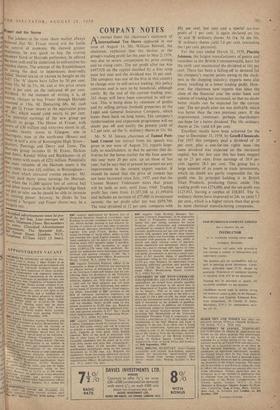COMPANY NOTES
A: extract from the chairman's statement of ,.International Tea Stores appeared in our issue of August 14. MP. William Bolwell, the chairman, explained that the decline in the group's trading profit for the year to May 2. 1959, was due to severe competition by price cutting and to rising costs. The net profit after tax was £497,928 on the capital doubled by ,a free scrip issue last year and the dividend was 10 per cent. The company was one of.the first in this country to change over to self-service trading; this policy continues and is sure to be beneficial, although costly. By the end of the current trading year, 263 shops will have been converted to self-ser- vice. This is being done by retention. of profits and by selling certain freehold properties to the Legal and General Insurance Company, which leases them back on long leases. The company's modernisation and expansion programme will no doubt pay off and justify the present yield of 4.2 per cent. on the 5s. ordinary shares at I Is. 9d.
Mr. N. M. Jensen, chairman of Tunnel Port- land Cement (an extract from his speech was given in our issue of August 21), reports hope- fully to stockholders, in that he advises that de- liveries for the home market for the June quarter this year were 20 per cent. up on those of last year; but he says that at present he cannot see any improvement in the cement export market. It should be noted that the price of cement has not been increased since July, 1957, and that the Cement Makers' Federation states that prices will be held, as now, until June, 1960. Trading profit has risen from £1,107,208 to £1,199,016 and includes an increase of £77,000 in investment income; the net profit after tax was £959,790. The total dividend at 12 per cent. compares with IN per cent. last year and a special tax-free profit of 1 per cent. is again declared on the `A' and 13' ordinary shares. At 31s. 3d. the 10s. 'B' ordinary shares yield 3.8 per cent. (excluding the 1 per cent. payment).
For the year ended March 31, 1959, Pinchin Johnson, the largest manufacturers of paints and varnishes in the British; Commonwealth, have for the sixth year maintained the dividend at 16i per cent. There has been a falling-off in demand for the company's marine paints owing to the slack- ness in the shipping industry; exports were also down, resulting in a lower trading profit, How- ever, the chairman now reports that since the close of the financial year the order book and volume of trading has increased, so that no doubt better results can be expected for the current year. The net profit after tax was £649,656, which was better than the two previous years. If the improvement continues, perhaps shareholders can hope for a better dividend. The 10s. ordinary shares at 24s. yield 6.8 per cent.
Excellent results have been achieved for the year to December 31, 1958, by Greeff-Chemicals. For 1957 this company paid a dividend of 20 per cent. plus a one-for-ten rights issue-the same dividend was expected on the increased capital; but for last year this has been stepped up to 25 per cent. from earnings of 38.9 per cent. against 28.3 per cent. The group has a large amount of its assets in trade investments, which no doubt are partly responsible for the profit rise. Its principal holding is in British Titan Products, producing titanic oxide. The trading profit was £274,080, and the net profit was £125,943, leaving a surplus of £38,803. The 5s. ordinary shares have improved to 24s. to yield 5.2 per cent., which is a higher return than that given by most chemical manufacturing companies.














































 Previous page
Previous page